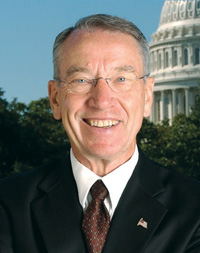The Centers for Medicare and Medicaid Services, now a month overdue to issue draft guidelines for reporting pharma-physician contacts as required under healthcare reform legislation, said the department is working on it, but offered nothing in the way of a timeline.
In a letter to Senators Grassley (R-IA) and Kohl (D-WI), the primary authors of and advocates for the legislation, CMS Administrator Donald Berwick blamed the delay on a presidential directive designed to ease the regulatory burden on industry.
“We have been working to implement the statutory provision,” wrote Berwick in a letter dated October 28. “This January, the President issued Executive Order 13563, which directs all Federal agencies to take steps to reduce regulatory burden. I believe we can implement the statutory goals of Section 6002 while minimizing burden on the regulated parties. In that vein, CMS is carefully reviewing this statutory requirement and working hard to ensure we meet these goals.”
That executive order, billed as an innovation booster, requires a 60-day public comment period on new regulations and orders federal agencies “to seek the views of those who are likely to be affected by rulemaking, even before issuing a notice of proposed rulemaking.”
CMS’s excuses aren’t good enough, Sen. Grassley told MM&M.
“The administrator’s response doesn’t tell us anything new,” said Grassley. “There’s no explanation for the delay and no indication of when to expect completion. It’s an inadequate response any way you look at it. Meanwhile, the U.S. government just settled with a medical device maker for $2.4 million over allegations of kickbacks to doctors to use the company’s products. The payments to doctors are the kind that might be prevented through disclosure as soon as the Sunshine Act is in place. The longer we wait, the more taxpayers miss out on the benefits.”
The Physician Payments Sunshine Act, long pushed by Sens. Kohl and Grassley as a means of mandating transparency by drug companies about their contacts with physicians, was included in the Patient Protection and Affordable Care Act (PPACA) which President Obama signed into law in March. Many top pharmas, seeking to get out in front of the law and show they have nothing to hide, have already begun reporting, but the agency’s guidelines are needed to standardize the data sets.
Beyond the executive order, the trouble is that the Sunshine Act ranks low on CMS’s priorities for implementing the mammoth healthcare reform law, paling in comparison to the urgency of getting Accountable Care Organizations and health insurance exchanges up and running or improving quality and safety at hospitals — sweeping changes requiring epic feats of bureaucratic boulder-rolling.
Berwick said in his letter to the Senators that “CMS has been actively engaged in stakeholder outreach” on the Sunshine provisions, noting an “Open Door Forum” that drew 700 participants in March as well as meetings with 15 “external stakeholder groups” from manufacturers and trade associations to state governments and advocacy groups.
A week ago, a strange bedfellows coalition of industry groups and advocates pressed Health and Human Services Secretary Kathleen Sebelius to speed implementation of the measures, saying that “an absence of established procedures could harm both the companies who are trying to comply with the law and the public who stands to benefit from increased transparency of these relationships.”
The law requires companies to begin collecting information on contacts with healthcare professionals beginning January 1, and to begin submitting data to HHS at the end of March, 2013.







